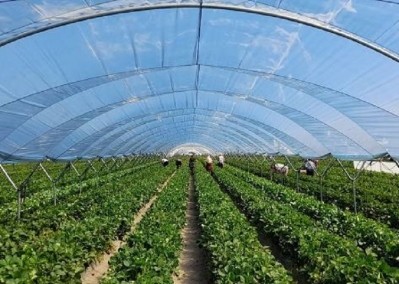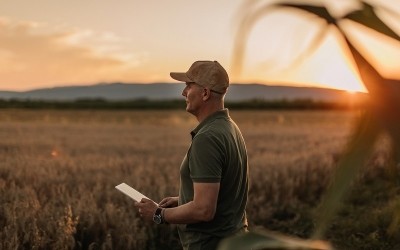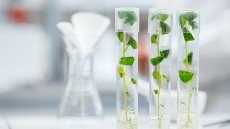Wood distillate can boost basil growth, counter bio-plastic setbacks: Italian study

There has been growing concern about the impact of bio-plastics on both plant and human health in agriculture. While bio-plastics are considered an eco-friendly alternative to traditional plastics as they are derived from renewable sources, they have also raised questions about their compatibility with the delicate ecosystem of agriculture.
Previous studies have suggest that these materials may not be the panacea for environmental issues they were once thought to be. Researchers have hypothesised that that certain bio-plastic components, when breaking down, release substances that may hinder the optimal growth of crops. In particular, the use of WD in bio-plastic formulations has come under scrutiny, with preliminary findings indicating potential repercussions on basil plants.
Basil, a staple herb in culinary and medicinal applications, appears to be sensitive to the introduction of bio-plastics infused with WD. The intricate interplay between the bio-plastic and basil plants raises concerns about the long-term viability of such agricultural practices.
The potential effects on basil plants include stunted growth, compromised nutrient absorption and alterations in the composition of essential oils that contribute to the herb's flavour and medicinal properties.
Wood this help or hurt the environment?
In a first-of-its-kind study, researchers at the University of Siena and University of Naples delved into the interaction between WD and starch-based bio-plastic, exploring their impact on basil plants. The study, motivated by the Sustainable Development Goals (SDG) of the 2030 Agenda, sheds light on concerns about bio-plastics' sustainability and their potential harm to crop growth and the environment.
Wood distillate or WD — also known as wood vinegar or pyroligneous acid — is a promising solution as it is a natural enhancer of plant growth, derived from plant bio-mass waste It has been recently included in the list of agricultural products for use in organic farming.
In the current study, physiological and biochemical parameters were analysed, revealing that WD increased total soluble protein and ascorbic acid (vitamin C) content while reducing oxidative stress. In contrast, bio-plastic alone led to a decline in these parameters.
The study produced several key findings, one of which was that WD enhanced the nutritional value of basil by significantly increasing protein and vitamin C levels in basil’s edible parts. At the same time, starch-based bio-plastic, when added to the mix, hindered basil's physiological development. It led to reduced sugars, increased malondialdehyde (MDA) levels and impacted chlorophyll content.
The researchers observed significant differences in basil plants subjected to different treatments. Basil plants treated with WD alone exhibited the highest development stages, surpassing those treated with bio-plastic alone. The combination of WD and bio-plastic showed positive effects on plant height, leaf number and shoot fresh weight, indicating a potential synergy between the two substances.
Furthermore, WD showed promise in mitigating the oxidative stress caused by bio-plastic. It elevated key parameters (including chlorophyll and protein) and reduced oxidative stress, counteracting the negative impacts of bio-plastic.
Future indications and further exploration
As the world grapples with plastic pollution and seeks eco-friendly alternatives, the aforementioned findings underscore the importance of sustainable practices in agriculture. This includes WD emerges as a natural solution that not only supports plant growth but also addresses concerns surrounding bio-plastic.
Collaborative efforts between scientists, farmers, and policymakers are underway to establish guidelines and standards for the responsible use of bio-plastics in agriculture. This includes exploring alternative formulations that minimise the potential harm to plant life.
Furthermore, research is being conducted to better understand the dynamics of WD in bio-plastics and its specific impact on basil plants. This nuanced approach aims to identify mitigation strategies and alternative materials that maintain the ecological benefits of bio-plastics without compromising the health of agricultural ecosystems.
This research opens avenues for further exploration into the use of natural products like WD to mitigate the negative impact of bio-plastics on plant health and supports the transition towards sustainable agricultural practices aligned with the principles of the circular economy. It also calls for a critical assessment of the environmental impact of new technologies and products, encouraging a shift towards natural alternatives.
At the same time, it underscores the imperative to strike a balance between environmental consciousness and the preservation of crop health and provides valuable insights into the intricate relationship between WD, bio-plastic and plant health. This paves the way for further exploration of sustainable strategies to counteract the negative effects of plastic in agriculture while simultaneously contributing to a greener and healthier future.
Source: Science of the Total Environment
“Exploring sustainable alternatives: Wood distillate alleviates the impact of bio-plastic in basil plants”
https://doi.org/10.1016/j.scitotenv.2023.166484
Authors: Silvia Celletti, et al.
























